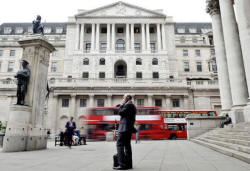|
The BCC's Quarterly Economic Survey of businesses, the largest
of its kind, said sales at services firms that make up the bulk
of the economy were steady in the third quarter.
But there was little pick-up in pay pressures or investment,
both of which the BoE expects to rise markedly next year.
Overall the BCC described the survey as "uninspiring", with
political uncertainty, currency fluctuations and Brexit clearly
affecting British businesses.
Despite confounding forecasts that the 2016 vote to leave the
European Union would lead to a sudden slowdown, Britain's
economy has struggled this year, posting its worst first-half
performance since 2012.
The BCC said price pressures in companies, while high
historically, looked likely to peak soon.
"Against this backdrop, it seems extraordinary that the Bank of
England are considering raising interest rates," said Suren
Thiru, BCC head of economics.
In September the BoE said interest rates would probably rise "in
the coming months" if the economy continued to grow and price
pressures kept building.
INFLATION
The BCC survey suggested that business activity was probably
strong enough to absorb slack in the economy - one of the BoE's
markers for raising rates soon, JPMorgan economist Allan Monks
said in a research note.
"Another marker, however, was to see underlying inflation
pressures building. But the pay settlements reading of the BCC
remained close to a record low in (the third quarter)," Monks
added.
A majority of economists polled by Reuters think the BoE will
move at its next meeting in November - but most also said it
would be a mistake to act now.
Unlike the larger services sector, manufacturers enjoyed both
better domestic and export sales over the past three months, the
BCC said.
While gauges of confidence in turnover and profitability stood
at their highest levels since 2015, the survey pointed to only a
marginal improvement in manufacturers' investment intentions.
A slightly larger proportion of manufacturers said they expected
to raise prices, but this was mostly down to the cost of raw
materials rather than pressure from pay settlements.
In the services sector, a net 15 percent of firms reported that
pay was putting pressure on prices - up just a percentage point
from the five-year low struck in the second quarter.
Other surveys, including one from the BoE's regional advisers,
have pointed to similar weakness in corporate pay intentions.
(Editing by Gareth Jones)
[© 2017 Thomson Reuters. All rights
reserved.] Copyright 2017 Reuters. All rights reserved. This material may not be published,
broadcast, rewritten or redistributed.
 |
|




